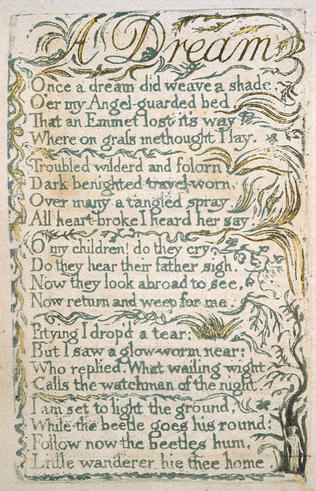 |
Wikipedia Commons Songs of Innocence Plate 12, Copy G |
Songs of Innocence, Plate 18, (E 12)
"The Divine Image.
To Mercy Pity Peace and Love,
All pray in their distress:
And to these virtues of delight
Return their thankfulness.
For Mercy Pity Peace and Love,
Is God our father dear:
And Mercy Pity Peace and Love,
Is Man his child and care.
For Mercy has a human heart
Pity, a human face:
And Love, the human form divine,
And Peace, the human dress.
Then every man of every clime,
That prays in his distress,
Prays to the human form divine
Love Mercy Pity Peace.
And all must love the human form,
In heathen, turk or jew.
Where Mercy, Love & Pity dwell,
There God is dwelling too"
The Divine Image expresses the inclusiveness of God with
humanity. Man is created in the image of God so that he may express
in the flesh the nature of God who is Spirit. Humankind's nature
is a implementation of God his creator. Just as God is not isolated
from his creation, man is not meant to be isolated from his fellow
man. We are meant to feel mercy by being touched in our
hearts by another's suffering. We are meant to see with pity
the face of every face revealing the underlying humanity which joins
man with man. We are meant to express the bonds of love
which cement us into one body which incorporates all. We are meant
to distinguish the inner truth which resides in each from the outer
appearances which prevent us from being at peace with
others.
This poem is Blake's plea that mankind not be deceived by the
outward appearances of nationality, race or creed. Within us are the
same avenues for being in communication with God, 'out father dear,'
and recognizing ourselves as being as he is.
THERE is NO NATURAL RELIGION, (E 3)
"Therefore God becomes as we are, that
we may be as he is"
Four Zoas, Page 126, (E 395)
Annotations to Swedenborg, (E 603)
The path of Innocence is not traveled by all. Blake sees that
mankind is marked by his choices. In London from Songs
of Experience, Blake shows us the consequence of stifling our
ability to respond to the Divine Image with Mercy, Pity, Peace and
Love. He sees it in the streets he walks, the faces he encounters,
the cries of the helpless and in failures of human relationships.
Songs of Experience, Plate 46, (E 26)
"LONDON
I wander thro' each charter'd street,
Near where the charter'd Thames does flow.
And mark in every face I meet
Marks of weakness, marks of woe.
In every cry of every Man,
In every Infants cry of fear,
In every voice: in every ban,
The mind-forg'd manacles I hear
How the Chimney-sweepers cry
Every blackning Church appalls,
And the hapless Soldiers sigh
Runs in blood down Palace walls
But most thro' midnight streets I hear
How the youthful Harlots curse
Blasts the new-born Infants tear
And blights with plagues the Marriage hearse"



















